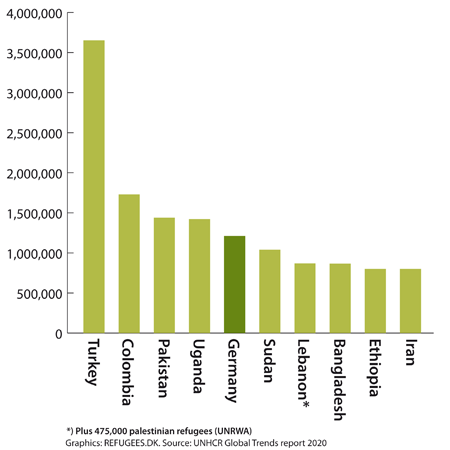Could refugees not stay in the neighbour countries?
The short answer is: They do! But it is not a durable solution. The rich countries should send more money to the neighbour countries, but that is not enough. More have to be lifted out of the heavily strained areas and get resettled in more stable countries.
Many of the ones arriving in Denmark have already tried to survive in a neighbour country for a period, sometimes for many years. Moving to the other end of the world is not the forst thought that comes to mind. Furthermore it's extremely expensive to come to Europe, and usually very dangerous.
DENMARK VERSUS LEBANON 2020
In Turkey, only 10% of the Syrian refugees live in refugee camps. The rest are struggling to survive on their own – with limited rights to work, and the children have no access to schools. Turkey is not even safe, as refugees are often returned across the border to Syria and Iran. It's not possible to be granted asylum in Turkey, only to be installed temporarily in a refugee camp. If Europe had received the same number of refugees as Turkey, 26 mio would have arrived to Europe.
Three out of four refugees are in a neigbour country. Thus, most of the Syrian refugees are in Turkey, Jordan or Lebanon, while the Afghans are in Pakistan or Iran. This puts extra pressure on countries which already have enough problems with internal conflicts and a livelihood for their own population. The global society does not contribute sufficiently to these host nations, only making speaches and empty promises to "assist in the neighbour regions".
The developing countries are hosting the majority of the world's refugees. Only 16% are in developed countries. Out of these, Denmark has received very few imeasured by our population and our economy (read more under Does Denmark receive many refugees on a global scale?)
10 COUNTRIES HOUSING THE LARGEST AMOUNTS OF REFUGEES 2020
Many of the refugees who arrive in Denmark have also tried to live in neighbour countries for a period. To flee to another continent is not the first thought that comes to people. Moreover, it is very expensive to get to Europe and the journey usually means risking your life.
In Turkey, only 10% of the Syrian refugees are living in refugee camps. The rest are trying to survive as best they can – thay have no right to work, and the children have no access to school. Tutkey is not safe either, refugees are being deported over the border back to Syria and Iran, and it is not possible to apply for asylum in Turkey – at most, you can be temporarily accommodated in a refugee camp. If Europe had taken a similar amount proportionally as Turkey, 26 mio would have arrived to Europe.



